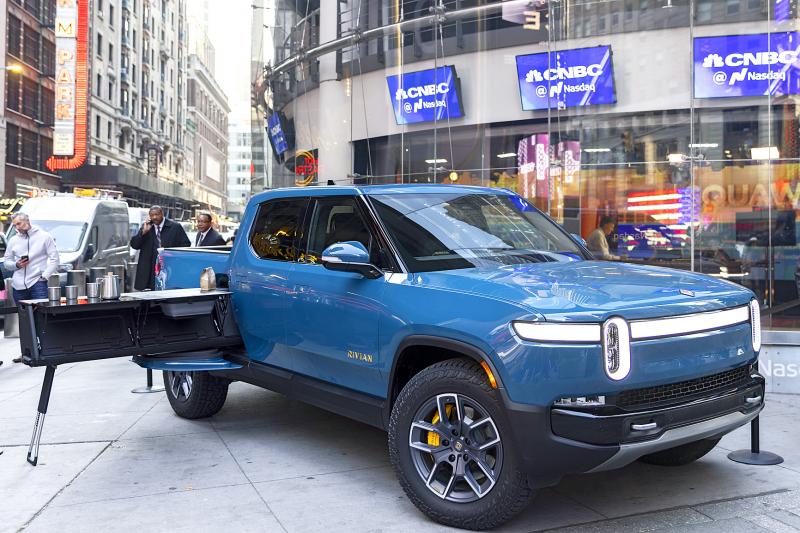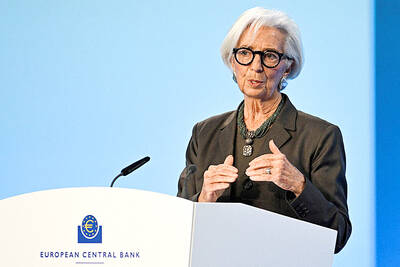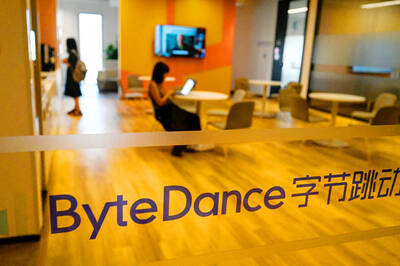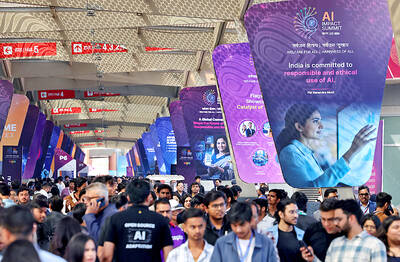Rivian Automotive Inc ended its first day as a public company valued at almost US$88 billion, more than tripling its last private valuation after investors piled into last year’s largest initial public offering (IPO).
That puts the electric truck maker on par with General Motors Co and makes it more valuable than Ford Motor Co, one of its top investors, as well as EV rival Lucid Group Inc On a fully diluted basis, including options and restricted stock units, the California-based company is valued at about US$98 billion.
That compares with Rivian’s valuation of US$27.6 billion after a US$2.65 billion funding round in January, Bloomberg previously reported.

Photo: AP
Backed by deep-pocketed companies such as Amazon.com Inc and Ford, Rivian sold 153 million shares on Tuesday for US$78 each after marketing 135 million for US$72 to US$74, a range it had earlier elevated from US$57 to US$62.
The company’s almost US$12 billion IPO is the biggest globally this year, and the sixth-largest ever on a US exchange, data showed.
Rivian’s shares, which rose as much as 53 percent on Wednesday to briefly push the company’s market value to US$104 billion, closed at US$100.73, up 29 percent from the IPO price.
Rivian is looking to make a dent in the electric vehicle industry led by Tesla Inc, which has a market value of almost US$1.1 trillion after its shares gained 52 percent this year.
R.J. Scaringe, Rivian’s founder and CEO, said on Wednesday that the company’s biggest challenge is the “health of the supply chain” as it ramps up production amid parts shortages.
The valuation reflects the company’s ability to scale quickly and its plan to build commercial vehicles, Scaringe said.
That starts with 100,000 electric delivery vans for Amazon, which Scaringe said was an “initial order.”
In addition to consumer EVs, Tesla has also built a strong and growing energy-storage business including solar, home and commercial energy storage.
Scaringe indicated that Rivian is looking at expanding in similar lines of business.
“For us, it’s a question of how do we, as rapidly as possible, transition ourselves away from a fossil-fuel based economy,” Scaringe said.
“That of course has a huge focus on the transportation products, but it also includes energy products, and this is something that we will certainly get into as we really try to accelerate that,” he added.
The hunger for environmentally friendly stocks is also seen as contributing to the IPO’s success.
Rivian set aside 0.4 percent of its IPO shares for users of SoFi Technologies Inc’s trading platform, letting them invest at the offer price of US$78 before public trading started.
While that is a small portion of the overall deal, retail investors have proved their ability to prop up stocks they believe in, and many are devotees of EV names such as Tesla and Lucid.

European Central Bank (ECB) President Christine Lagarde is expected to step down from her role before her eight-year term ends in October next year, the Financial Times reported. Lagarde wants to leave before the French presidential election in April next year, which would allow French President Emmanuel Macron and German Chancellor Friedrich Merz to find her replacement together, the report said, citing an unidentified person familiar with her thoughts on the matter. It is not clear yet when she might exit, the report said. “President Lagarde is totally focused on her mission and has not taken any decision regarding the end of

French President Emmanuel Macron told a global artificial intelligence (AI) summit in India yesterday he was determined to ensure safe oversight of the fast-evolving technology. The EU has led the way for global regulation with its Artificial Intelligence Act, which was adopted in 2024 and is coming into force in phases. “We are determined to continue to shape the rules of the game... with our allies such as India,” Macron said in New Delhi. “Europe is not blindly focused on regulation — Europe is a space for innovation and investment, but it is a safe space.” The AI Impact Summit is the fourth

AUSPICIOUS TIMING: Ostensibly looking to spike the guns of domestic rivals, ByteDance launched the upgrade to coincide with the Lunar New Year China’s ByteDance Ltd (字節跳動) has rolled out its Doubao 2.0 model, an upgrade of the country’s most widely used artificial-intelligence (AI) app, the company announced on Saturday. ByteDance is one of several Chinese firms hoping to generate overseas and domestic buzz around its new AI models during the Lunar New Year holiday, which began yesterday, when hundreds of millions of Chinese partake in family gatherings in their hometowns. The company, like rival Alibaba Group Holding Ltd (阿里巴巴), was caught off-guard by DeepSeek’s (深度求索) meteoric rise to global fame during last year’s Spring Festival, when Silicon Valley and investors worldwide were

Advanced Micro Devices Inc (AMD) is partnering with Tata Consultancy Services Ltd (TCS) to deploy the US chipmaker’s latest artificial intelligence (AI) data center technology in India, challenging Nvidia Corp in one of the world’s fastest-growing markets. AMD is to offer its Helios data center blueprint and work with TCS to support up to 200 megawatts of AI infrastructure capacity in India, the companies said in a statement on Monday. “AI adoption is accelerating from pilots to large-scale deployments, and that shift requires a new blueprint for compute infrastructure,” AMD chief executive officer Lisa Su (蘇姿丰) said in the statement. “Together with